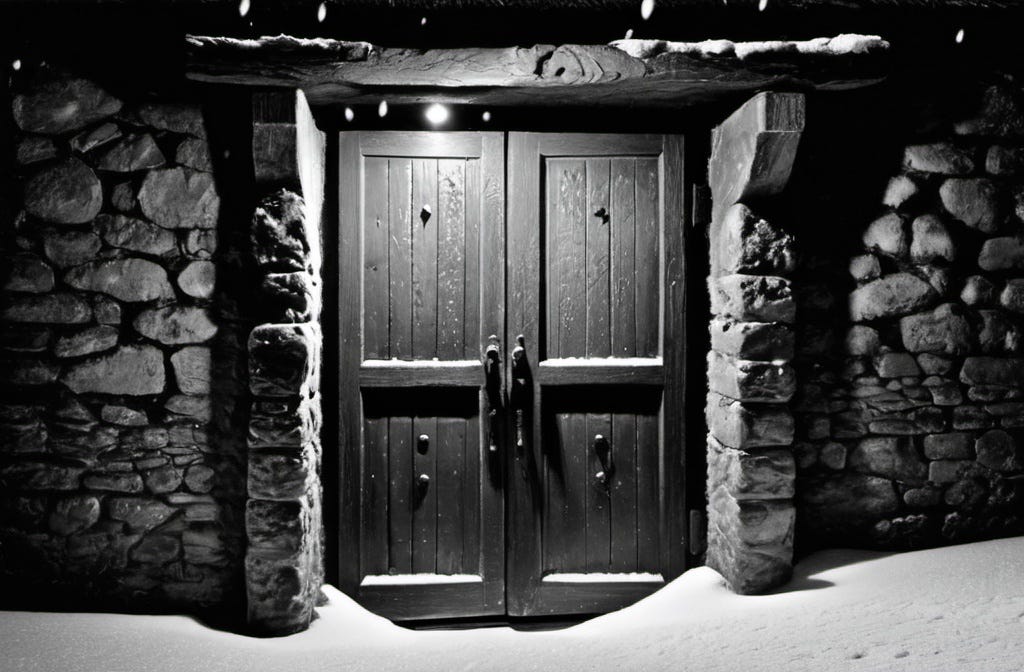A Brief Negotiation
The Falcon's Children, Chapter 26
The alder of Dernbridge was a pale moonfaced man with a white beard and a red apron. His hair was bound in a knot that bounced behind him as he moved nervously around his two-room house, looking for chairs to seat his unexpected guests.
“I hope my lords will be comfortable,” he said in a quavering voice that strained for dignity. “There’s bread and cheese in my larder if you happen to want it, I suppose you’ll be hungry, and I can stoke the fire …”
He had a younger man of the village with him, bearded with the muscles of a blacksmith, but if those muscles were intended to supply some kind of protection or support you wouldn’t know it from how the alder’s eyes flickered wildly from one soldier to the next, like a field mouse suddenly surrounded by hawks and hoping none of them were hungry —
“It’s all right,” Alsbet said, taking pity on him. “It’s all right, you’ve done well.”
“You can go now,” Berenek Skorshi said. “You’d best see to your people.”
The alder nodded stiffly. “Yes, my lord. My lords. Thank you.” He sketched a bow and made his way out of the house, tugging at a bearskin cloak as the night embraced him, his bigger bodyguard just a step behind.
The rooms were dark, despite the sullen fire, and the furniture carried the scars and grime that bespoke the alder’s unimportance in the scheme of things. There were only two windows, frosted over and looking out into the snow-mantled night, where the army from Caldmark now sprawled around and through Dernbridge, overwhelming the bridge, the tollhouse, the thirty-odd houses.
The alder had already gathered the town’s inhabitants at the shrine by the time the army descended upon him, and Veruna had decided they should stay there for what remained of the night — sleeping on benches or the stony floor, guarded by frescoed angels while officers occupied their homes and beds.
Do you have to turn them out of their houses? Alsbet had asked, worried that she was showing womanly weakness but wondering all the same, and the Old Hound had looked at her and smiled sadly. It’s better for my army, he told her, and in war that’s all that counts . . . that and killing the other fellow before he kills you.
Thinking, now, of the townsfolk huddling beneath the sacred images, clutching their loved ones close against the chill and cursing the follies of great lords, Alsbet felt the romance leak out of their night ride, and she shivered and went over to prod at the flames with the alder’s poker.
Behind her, Veruna stood with Lord Pter and his three captains, Rendell and Sedura and Skorshi, their murmurs no louder than the spitting fire. Benfred was also there, standing by one of the windows; he had brought a woman with him as his second, a slender leather-clad figure with a jutting nose who now stood poised and watchful near the door.
Alsbet didn’t want her uncle to join her by the fire, but she could sense he was going to cross to her several moments before he did — looming up at her elbow as she prodded the brands, his entire person a coagulation of unease.
“We should talk more,” he said quietly. “Not here, but soon.”
“Of course,” she said. “But not here.”
He nodded, and then as if unable to heed his own caution, went on: “You’re right that we should have told you. I think Cresseda — I think you knew her mind, in some way.”
“I knew that she hoped for a marriage, not that she hoped to win my hand at swordpoint. But now is not …” She half-raised her hand and he nodded and half-turned away — and then as if compelled he turned back, and murmured anew:
“When we have Rendale we will have between us a legitimacy that Cresseda needs, and needs desperately. You know that. We must confer about how —”
She was briefly grateful to the creaking sound that interrupted him, the noise of the door opening and letting in a stiff wind that stirred the fire, then two legionnaires as an escort for the delegation, and then —
— then him, just as she had imagined, an unarmed, windburned Paulus bar Merula, bareheaded with curls as dark as the night, giving his cloak a shake, crossing without hesitation to the alder’s splintered table.



